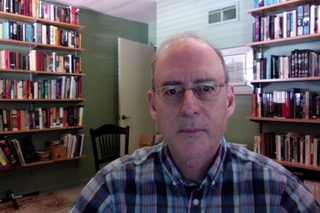After driving five hours back from the wedding of Louis Ferran and Anita Estevez in Miami, where I’d ineptly played the role of best man, the fan belt in my twenty-year-old Volkswagen broke in the worst possible place—Devil’s Hammock in Levy County which, along with the much larger Gulf Hammock, is the biggest empty spot on the northwest Florida map. It was 5:30 on a Sunday evening in April, 1988, the sun already nearing the tops of the dense stands of scraggly pines and scrub oaks oppressing both sides of the rough, potholed road.
For the past year I’d been living alone in a rented cabin near the Suwannee River in Gilchrist County, about twenty miles north of where I’d stranded myself, writing a book on the dark history of the turpentine trade in the early 20th century. Louis, an old college friend whom I’d seen very little of in the last few years, had called on me at the cabin in February to give me his good news and make his surprising—and frankly, unwelcome—request. Only after I’d reluctantly agreed to be his best man had he revealed that the wedding would take place in two months at the far end of the state, the home of his fiancée, Anita. Everything but the transportation would be paid for, and since the cost of a rental car well exceeded my slender budget, my only choice would be to drive my 1968 VW Bug with its twice-rebuilt engine.
Louis looked as healthy and happy as I’d ever seen him, a bit less thin but just as nocturnally pale as he had during our college years. We toasted his impending nuptials over whiskies, but as soon as he left, I felt more shanghaied than honored, especially after discovering that he’d approached two other friends before me, who’d been quicker on the draw with ready-made excuses why they couldn’t. On top of everything else, being the third choice for best man didn’t sit particularly well. But then, Louis’s cup had never run over with friends.
The last thing I wanted to do was leave my work, having just recently begun the actual writing after months of research. But considering that I’d never imagined the pallidly indoor, weedy, bookish, frequently depressive Louis getting married at all, and the fact that we’d been close once, I could hardly say no. I’m aware that my sour attitude toward the whole business was indefensible, but I couldn’t help resenting the way he’d come in person instead of calling, the better to corner me with an obligation.
I met his fiancée, Anita, a month or so later in Gainesville. She was tall, exactly Louis’s height, I noticed, a warm, vivacious, attractive young Cuban-American from a large family in Miami, her father having made his fortune in real estate. I found her quite pleasant and clearly devoted to Louis, but seeing them together, my first impression was of a glaring mismatch, though of course one had to hope for the best. He was an only child, the sixth-generation scion of a family that for more than a century had owned a number of orange and grapefruit groves in central Florida. He hadn’t planned to enter the family business, and his father apparently never expected it of him. When we were students together in Gainesville in the seventies, Louis had been an habitual reader of the 19th century Decadents, though his most beloved book was probably Sir Thomas Browne’s Urn Burial. But ten years on, he’d become, to my surprise, a journalist for a small newspaper in Holly Hill.
As if to hedge against any possibility of my backing out at the last minute, Louis had also neglected to mention the big-production scale of the wedding. The ceremony itself was painless enough, in spite of my having to wear a ridiculous gray, cutaway tuxedo that matched the groom’s. But our entrance to the huge reception was attended by blinding flashbulbs, video cameras rolling and induced applause as each of us made his red carpet-style entrance. It would have been laughable if I hadn’t been nearly paralyzed with stage fright at the imminence of my single duty: the best man’s toast. I rose to my feet, literally shaking with terror, then proceeded to humiliate myself by offering an overly literary, sixty-three-word toast (painstakingly composed the mostly sleepless night before), that essentially wished good luck and long life to the bride and groom, leaving the entire room puzzled and waiting for more. My loudly proclaimed “Salud!” in the teeth of that expectant silence got me off the hook and into a chair where, several drinks later, I was benumbed enough to realize that nobody cared about the damn toast anyway. But what could I have said in the traditional mock-roasting manner that would have had any other effect than to alienate the wedding guests? Louis had never been the kind of man about whom one could plausibly tell raunchy or sentimental stories to a packed room.
It had been an impulse to get off I-75 and pick up Highway 41 in Brooksville, then catch 19/98 north from Dunnellon through the Gulf and Devil’s Hammocks for a slower, more scenic route that was actually several miles closer to my cabin. I hadn’t bothered to tell anyone of my intentions, and this was a good decade before cell phones. I estimated my location to be about halfway between Otter Creek, barely a crossroads, and the handful of scattered houses known as Usher, and even if I’d been willing to walk to either one through what would soon be complete darkness, I didn’t want to leave my ancient but still fixable car unattended. I simply couldn’t afford to lose it, which left me with the single option of raising the hood and waiting for someone to stop. Failing a rescue, I could expect a miserable night sleeping on the tiny back seat. I hadn’t even thought to bring a flashlight. It was early in the month, and although it had been pleasantly warm in Miami, night-time temperatures as low as the fifties were still occurring this far north, and I had nothing warmer than a long-sleeved shirt.
In another half hour, the sun went down, and in that time only one vehicle passed, a north-bound, rattle-trap pick-up truck so overloaded with dilapidated household furnishings that the bumper almost dragged the road. There were three people riding in the cab, and the driver offered a jocular shrug as they passed, but he didn’t slow down. The truck noticeably swayed, and thinking there would soon be other cars, I didn’t overly mind missing this one.
I got out and leaned against the hood, feeling as much as listening to the silence that had crept in behind the truck’s boisterous passage. Birdsong gradually dwindled, and a swooping nighthawk dipped so close I could feel the wind of its passage on my face. Coyotes and feral pigs were common out this way and around my cabin, but it was doubtful that anything would bother me. Silence and solitude were the real beasts here.
I hadn’t eaten since the post-wedding brunch in Little Havana, and again wished I’d stayed on Highway 41, although the fan belt would have broken anyway, just somewhere closer to towns and tow trucks. I’d driven through the Gulf Hammock only once before, and never through Devil’s Hammock, and all I had to drink was half a bottle of water. There was nothing else to be done, so I stayed put, leaning against, then sitting, in the car, then pacing about, until long after the third beast, unmitigated darkness, had shown itself.
But there weren’t any more cars, which began to seem very odd after two hours of hearing nothing besides crickets, owls, and the frantic, repetitive screech of a vixen fox in heat. Chiefland, the only town of any size in the area, was about ten miles north, and one would one have thought there’d be at least some traffic. It had been a long drive on very little sleep and too much champagne the night before, and around ten p.m. I climbed into the back seat, locked the doors and cracked the windows. Curled up on the slanted seat, my glasses in my shirt pocket, using my overnight bag as a pillow and miserably uncomfortable, I waited for a drowsiness that wouldn’t come, even as the temperature slowly dropped. What sleep I got was fitful, shot through with uneasy dreams and obsessive musings about the kind of people likely to travel this lonely road at strange hours.
I got up to relieve myself around three a.m., shivering in the humid Florida cold. A gibbous moon had risen while I slept, and even the insects seemed to have settled down for the night. The only sound now was the maddening call of a nightjar, a chuck will’s widow. I’d heard them at the river, the same rhythmic, mechanical “chuck-will’s-wi-dow” going on for hours, with an echoing timbre that was especially eerie now. Turning back to the car, I glanced up the road, the broken asphalt spectral in the moonlight, and was startled by what for a moment looked like something standing in the middle of the road about a hundred feet away. In the time it took me to put on my glasses, whatever I thought I’d seen wasn’t there. Maybe a coyote, or somebody’s dog. Or a bear.
I told myself that it couldn’t be a person, not without a car, and nobody lived out here. Devil’s Hammock was seven thousand acres of wildlife management area, not to mention the hundred thousand acres contiguous with it on its southern edge that comprised the massive Gulf Hammock. A heightened awareness of my vulnerability, fairly well suppressed until now, burgeoned, but what could I do? Walking the ten miles to Chiefland on an empty stomach at three in the morning was out of the question.
And even if there were an armed someone out here lurking about, my car would be no protection against… well, what? Nothing at all. I was just tired and overly anxious. But sometime soon, probably by early morning, a car would stop. I got back in the car and lay down for a futile minute or so, then sat up, shivering. It was too cold, the seat too small, and that damn bird was driving me crazy. Walking would help warm me up, get me tired enough to sleep.
I climbed out, rolled up the window and locked the car, and after looking for the hundredth time for distant headlights and seeing none, I started walking up the moonlit road. As beat and hungry as I was, it felt good to move. I hadn’t realized how empty this road could be, and for this night, at least, for whatever reason, it seemed to belong to me. I walked less timidly, with longer strides, enjoying the lunar light on the road and the peace of the forest at night. If I weren’t stuck here against my will, I’d be grateful for the opportunity to experience this place in all its lonely splendor.
My energy began to flag after a mile or so, so I turned and headed back. When I reached my car, I took a sip of water, noticing in the dim light of the overhead bulb saw that it was 4:03 a.m., then capped the bottle and tossed it on the seat.
When I stood up, I saw headlights in the southern distance.
Now that deliverance was possibly at hand, I felt both immensely relieved and apprehensive. I had to flag this car down, whoever it was. It was probably my impatience, but it seemed to take an unnaturally long time for the lights to get brighter, as if the car were coming from a far greater distance away than was physically possible to see, even on such flat terrain. I stood on the side of the road, just behind my car, and waited as the lights finally became too bright to stare directly at. I waved my arms, ready to leap back if the car didn’t slow down. But it did slow down, the driver lowering his beams as he pulled up slowly beside me.
It was a very old, low-riding Cadillac, dusty, dented, its faded blue finish spotted with rust, and the idling V-8 engine sounded in need of a tune-up. The passenger window came down, and I took a step closer, leaning in to show my hopefully trustworthy face. There were two people in the car, a man and a woman, both well into middle age, and by their rumpled appearance and irritated expressions, I gathered that their time on the road had long since outlasted their patience. The man’s face, in the dim dashboard lights, was hard to see, but he was smoking a cigarette, and his frequent drags revealed a blotchy, sharp-featured face with a long nose, baggy, deep-set eyes and a gray, unkempt Van Dyke beard. He regarded me with weary disinterest, his free hand fiddling with the radio dial and finding only snow and static. The woman was long of limb, large-boned and a bit on the chunky side, her black hair obviously dyed, her heavily made-up face covering the ravaged remains of youthful beauty, and she wore a lumpy, pilled sweater over a black sheath dress. She, too, was smoking, looking me over with a red-lipped smile that did not include her eyes. Neither spoke.
“Hi. Thanks so much for stopping,” I said, hoping my smile wasn’t too eager. “Got a broken fan belt. Been here for hours. Yours is only the second car I’ve seen.”
“Why didn’t the first one stop?” the woman asked, her English faintly tinged with a Spanish accent, letting her red-nailed hand holding the cigarette hang from the window.
“A truck loaded with furniture,” I replied. “Three people in the seat. No room for a passenger.”
“They could have offered to call somebody,” the man said, his lazy baritone edged with anger and road-weariness. “Assholes.”
“Exactly what I thought,” I said.
There was something oddly familiar about both the man and the woman, though I couldn’t place them. The man’s voice, especially, bothered me with its nagging associations.
“Where were you headed?” the woman asked, her large, staring black eyes made strange by too much eye shadow and fake lashes.
“I live about twenty miles north of here, near the Suwannee River, nine miles northwest of Trenton. It’s pretty out of the way, but if you could give me a ride to Chiefland, I could get a motel room, and then find a mechanic tomorrow morning.”
“Can we do that, cookie?” she asked, in her harsh, smoker’s voice, still looking at me and smiling her mirthless smile. “Can we take this young scholar where he needs to go?”
“We could take him to Chiefland; it’s on the way,” the man said, his deep voice mossed with resignation and too many cigarettes. “But it just wouldn’t feel right not taking him all the way home. He’s met his quota of misery for one day, haven’t you, bud?”
“And then some,” I said, smiling to hide my growing uneasiness.
I couldn’t say why, and therefore fought against a growing feeling that there was something very wrong about these people, something I couldn’t explain. My body seemed to be trying to make me understand this, through sweaty palms and a rising heartbeat, way ahead of my ability to comprehend what it was about them that was setting off alarm bells. They’d said and done nothing the least bit threatening. I knelt a little lower and peered into the car. They appeared to be living out of it. All manner of junk was piled up in the back seat: pillows, blankets, fast-food containers, loose clothing, several pieces of electronic equipment that I couldn’t identify, and no room for a passenger except in the front seat. The man was peering intently at me, his sandy hair sparse and growing unheeded on the sides, his heavy-lidded eyes expressing the oddest combination of avidity, amused contempt, and utter disillusionment, his bearded mouth now forming the same falsely solicitous smile as the woman’s—his wife, almost certainly—concealing something that still eluded me, but which was slowly elbowing its way into my awareness.
And yet they wanted to give me a ride, of that I felt certain. Then why this ambivalence about accepting the very thing I’d so fervently wished for?
“What you’re gonna need to do,” the driver said, “is call a tow truck soon as we drop you off, and have them tow your car into Chiefland. He’ll gouge you, but what can you do? He’ll know a foreign car mechanic in town. Then get a friend to chauffeur you up there when it’s ready to pick up. No doubt you have plenty of friends,” he added, a subtle sneer in his voice.
“Uh, yeah, sure, a few,” I replied, trying to ignore the provoking tone. “But hey, I don’t want to put you folks to the trouble of taking me all the way.”
“If it was trouble, we wouldn’t have stopped,” the woman said, an edge of impatience in her voice. “So go ahead and get what you need out of your car, lock it up and climb in. Kind of a mess back there, but you can sit between us.”
I was torn between the overwhelming desire to accept their offer and an inexplicably urgent feeling that getting into their car would be the biggest mistake of my life. As a delaying tactic, I said, “I’m Jacob, by the way. Just so we’re not strangers.”
“An unspeakable pleasure, Jacob,” the man said. “I’m Louis, and this my adored and adoring wife, Anita. Pleased to make your…” He met my confused, open-mouthed stare with a widening grin. “…re-acquaintance.” He began to shake with suppressed merriment that finally exploded into laughter, and his wife soon joined in, showing large, ill-kept teeth.
“What are you waiting for, Jake?” she asked, beckoning slightly with her cigarette hand. “Make up your mind. The clock’s ticking on this once-in-a-lifetime offer.”
It had finally caught up with my slow, denying brain what the animal in me already knew: this was the bride and groom, somehow decades older than when we’d thrown the rice and watched them drive away on their honeymoon the night before, in this very same Cadillac, I now realized, a gift from Anita’s family, its shiny newness, like the bride’s beauty and freshness, lost long ago.
My response to this was both predictable, and in retrospect, rather disappointing, probably as much to whatever versions of Louis and Anita these were, as it was to me.
“Who are you people?” I said weakly, backing away from the car. “Why are you doing this?”
“Last chance, Jake,” Louis said. “We’ll take you right to your front door, Scout’s Honor. And on the way, we can… reminisce.”
I kept backing away, until I stumbled on a fallen branch and fell backwards. I wasn’t hurt, just embarrassed, and scrambled to my feet in time to see Anita glance back at Louis, shrug, then flick her cigarette butt at me as they drove off. I watched the taillights slowly fade into the distance, but it wasn’t until the last visual trace of their passing had disappeared that I climbed back into my car and lay sleeplessly until morning.
About the Author
 Jeffrey Greene was born in Michigan, raised in Florida, and currently lives in Bethesda, Maryland. He has been writing and publishing short stories and the occasional novella since the 1980s. Some of the publications in which his stories have appeared are the North American Review, Tomorrow Speculative Fiction, Oasis, Reactor Magazine, Potomac Review, decomP Magazine, Zahir Speculative Fiction, and most recently, Bewildering Stories.
Jeffrey Greene was born in Michigan, raised in Florida, and currently lives in Bethesda, Maryland. He has been writing and publishing short stories and the occasional novella since the 1980s. Some of the publications in which his stories have appeared are the North American Review, Tomorrow Speculative Fiction, Oasis, Reactor Magazine, Potomac Review, decomP Magazine, Zahir Speculative Fiction, and most recently, Bewildering Stories.
His short story, “The Blind Gambler,” was included in the anthology,“100% Pure Florida Fiction,” in 2000, published by the University of Florida. He has self-published two collections of short stories: Stories From the Cold Room, and The Iron Desert and Other Stories.
![]()





